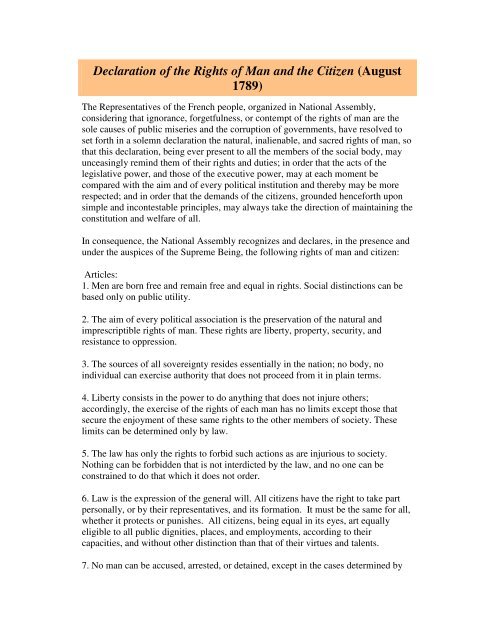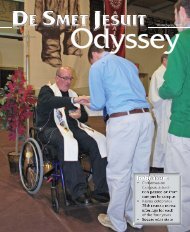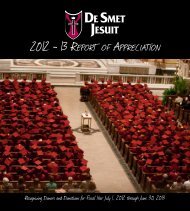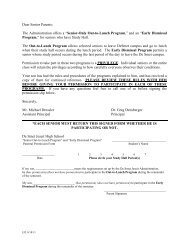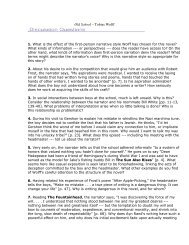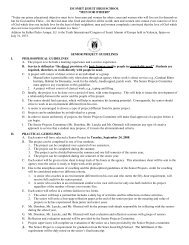Declaration of the Rights of Man and the Citizen ... - Resources
Declaration of the Rights of Man and the Citizen ... - Resources
Declaration of the Rights of Man and the Citizen ... - Resources
Create successful ePaper yourself
Turn your PDF publications into a flip-book with our unique Google optimized e-Paper software.
<strong>Declaration</strong> <strong>of</strong> <strong>the</strong> <strong>Rights</strong> <strong>of</strong> <strong>Man</strong> <strong>and</strong> <strong>the</strong> <strong>Citizen</strong> (August<br />
1789)<br />
The Representatives <strong>of</strong> <strong>the</strong> French people, organized in National Assembly,<br />
considering that ignorance, forgetfulness, or contempt <strong>of</strong> <strong>the</strong> rights <strong>of</strong> man are <strong>the</strong><br />
sole causes <strong>of</strong> public miseries <strong>and</strong> <strong>the</strong> corruption <strong>of</strong> governments, have resolved to<br />
set forth in a solemn declaration <strong>the</strong> natural, inalienable, <strong>and</strong> sacred rights <strong>of</strong> man, so<br />
that this declaration, being ever present to all <strong>the</strong> members <strong>of</strong> <strong>the</strong> social body, may<br />
unceasingly remind <strong>the</strong>m <strong>of</strong> <strong>the</strong>ir rights <strong>and</strong> duties; in order that <strong>the</strong> acts <strong>of</strong> <strong>the</strong><br />
legislative power, <strong>and</strong> those <strong>of</strong> <strong>the</strong> executive power, may at each moment be<br />
compared with <strong>the</strong> aim <strong>and</strong> <strong>of</strong> every political institution <strong>and</strong> <strong>the</strong>reby may be more<br />
respected; <strong>and</strong> in order that <strong>the</strong> dem<strong>and</strong>s <strong>of</strong> <strong>the</strong> citizens, grounded henceforth upon<br />
simple <strong>and</strong> incontestable principles, may always take <strong>the</strong> direction <strong>of</strong> maintaining <strong>the</strong><br />
constitution <strong>and</strong> welfare <strong>of</strong> all.<br />
In consequence, <strong>the</strong> National Assembly recognizes <strong>and</strong> declares, in <strong>the</strong> presence <strong>and</strong><br />
under <strong>the</strong> auspices <strong>of</strong> <strong>the</strong> Supreme Being, <strong>the</strong> following rights <strong>of</strong> man <strong>and</strong> citizen:<br />
Articles:<br />
1. Men are born free <strong>and</strong> remain free <strong>and</strong> equal in rights. Social distinctions can be<br />
based only on public utility.<br />
2. The aim <strong>of</strong> every political association is <strong>the</strong> preservation <strong>of</strong> <strong>the</strong> natural <strong>and</strong><br />
imprescriptible rights <strong>of</strong> man. These rights are liberty, property, security, <strong>and</strong><br />
resistance to oppression.<br />
3. The sources <strong>of</strong> all sovereignty resides essentially in <strong>the</strong> nation; no body, no<br />
individual can exercise authority that does not proceed from it in plain terms.<br />
4. Liberty consists in <strong>the</strong> power to do anything that does not injure o<strong>the</strong>rs;<br />
accordingly, <strong>the</strong> exercise <strong>of</strong> <strong>the</strong> rights <strong>of</strong> each man has no limits except those that<br />
secure <strong>the</strong> enjoyment <strong>of</strong> <strong>the</strong>se same rights to <strong>the</strong> o<strong>the</strong>r members <strong>of</strong> society. These<br />
limits can be determined only by law.<br />
5. The law has only <strong>the</strong> rights to forbid such actions as are injurious to society.<br />
Nothing can be forbidden that is not interdicted by <strong>the</strong> law, <strong>and</strong> no one can be<br />
constrained to do that which it does not order.<br />
6. Law is <strong>the</strong> expression <strong>of</strong> <strong>the</strong> general will. All citizens have <strong>the</strong> right to take part<br />
personally, or by <strong>the</strong>ir representatives, <strong>and</strong> its formation. It must be <strong>the</strong> same for all,<br />
whe<strong>the</strong>r it protects or punishes. All citizens, being equal in its eyes, art equally<br />
eligible to all public dignities, places, <strong>and</strong> employments, according to <strong>the</strong>ir<br />
capacities, <strong>and</strong> without o<strong>the</strong>r distinction than that <strong>of</strong> <strong>the</strong>ir virtues <strong>and</strong> talents.<br />
7. No man can be accused, arrested, or detained, except in <strong>the</strong> cases determined by
<strong>the</strong> law <strong>and</strong> according to <strong>the</strong> forms it has prescribed. Those who procure, expedite,<br />
execute, or cause arbitrary orders to be executed, ought to be punished: but every<br />
citizen summoned were seized in virtue <strong>of</strong> <strong>the</strong> law ought to render instant obedience;<br />
he makes himself guilty by resistance.<br />
8. The law ought only to establish penalties that are strict <strong>and</strong> obviously necessary,<br />
<strong>and</strong> no one can be punished except in virtue <strong>of</strong> a law established <strong>and</strong> promulgated<br />
prior to <strong>the</strong> <strong>of</strong>fense <strong>and</strong> legally applied.<br />
9. Every man being presumed innocent until he has been pronounced guilty, if it is<br />
thought indispensable to arrest him, all severity that may not be necessary to secure<br />
his person ought to be strictly suppressed by law.<br />
10. No one should be disturbed on account <strong>of</strong> his opinions, even religious, provided<br />
<strong>the</strong>ir manifestation does not upset <strong>the</strong> public order established by law.<br />
11. The free communication <strong>of</strong> ideas <strong>and</strong> opinions is one <strong>of</strong> <strong>the</strong> most precious <strong>of</strong> <strong>the</strong><br />
rights <strong>of</strong> man; every citizen can <strong>the</strong>n freely speak, write, <strong>and</strong> print, subject to<br />
responsibility for <strong>the</strong> abuse <strong>of</strong> this freedom in <strong>the</strong> cases is determined by law.<br />
12. The guarantee <strong>of</strong> <strong>the</strong> rights <strong>of</strong> man <strong>and</strong> citizen requires a public force; this force<br />
<strong>the</strong>n is instituted for <strong>the</strong> advantage <strong>of</strong> all <strong>and</strong> not for <strong>the</strong> personal benefit <strong>of</strong> those to<br />
whom it is entrusted.<br />
13. A general tax is indispensable for <strong>the</strong> maintenance <strong>of</strong> <strong>the</strong> public force <strong>and</strong> for <strong>the</strong><br />
expenses <strong>of</strong> administration; it ought to be equally apportioned among all citizens<br />
according to <strong>the</strong>ir means.<br />
14. All <strong>the</strong> citizens have a right to ascertain, by <strong>the</strong>mselves or by <strong>the</strong>ir<br />
representatives, <strong>the</strong> necessity <strong>of</strong> <strong>the</strong> public tax, to consent to it freely, to follow <strong>the</strong><br />
employment <strong>of</strong> it, <strong>and</strong> to determine <strong>the</strong> quota, <strong>the</strong> assessment, <strong>the</strong> collection, <strong>and</strong> <strong>the</strong><br />
duration <strong>of</strong> it.<br />
15. Society has <strong>the</strong> right to call for an account <strong>of</strong> his administration by every public<br />
agent.<br />
16. Any society in which <strong>the</strong> guarantee <strong>of</strong> <strong>the</strong> rights is not secured, or <strong>the</strong> separation<br />
<strong>of</strong> powers not determined, has no constitution at all.<br />
17. Property being a sacred to <strong>and</strong> inviolable right, no one can be deprived <strong>of</strong> it,<br />
unless illegally established public necessity evidently dem<strong>and</strong>s it, under <strong>the</strong><br />
condition <strong>of</strong> a just <strong>and</strong> prior indemnity.<br />
[Source: Frank Maloy Anderson, ed., The Constitution <strong>and</strong> O<strong>the</strong>r Select Documents Illustrative <strong>of</strong> <strong>the</strong><br />
History <strong>of</strong> France, 1789-1907 (New York: Russell <strong>and</strong> Russell, 1908), pp. 59-61.]


